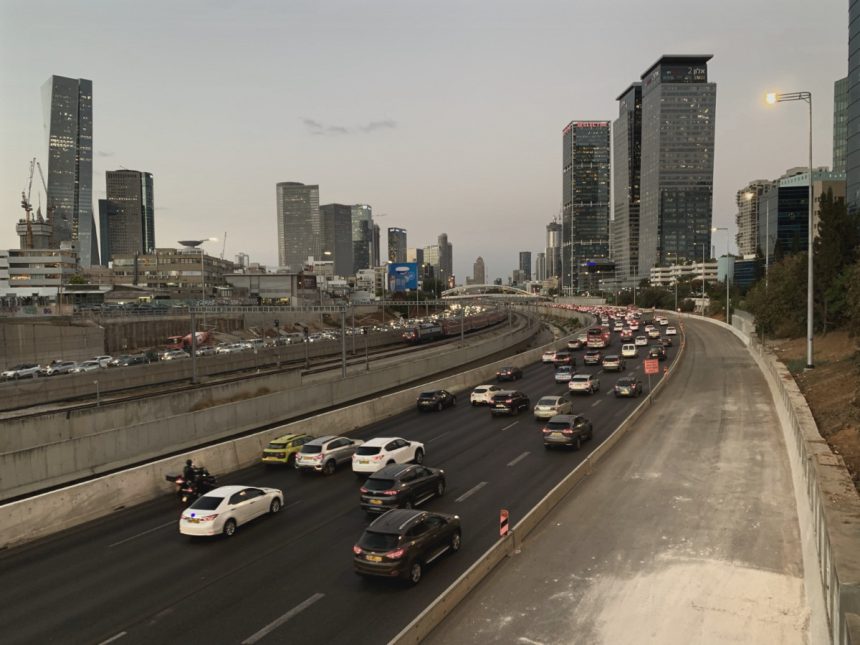While Tel Aviv is known to be a sunny city where people lead health conscious lifestyles, there are a few factors which contribute to decreased air quality. These factors include, but are not limited to; industrial pollution, seasonal pollution, and most noticeable a weather phenomenon we call ‘sharav’ – sandstorms. Whilst air quality does not pose an overwhelming health concern, it is important to be aware of these occurrences as they can affect the health of individuals living in Tel Aviv, as well as people visiting the city.
Industrial pollution
The main sources of unnatural air pollution in Tel Aviv are transportation, industry, and power generation. The city’s heavy traffic and use of diesel buses and trucks contribute to high levels of contamination. In addition, industrial activities in the surrounding areas can also affect the air quality in Israel as a whole.
To address this issue, the city has taken various measures, such as promoting alternative modes of transportation and encouraging the use of electric cars.
Seasonal allergies
Seasonal allergies are common in Tel Aviv, particularly in the spring and fall. During these seasons, the air is filled with pollen from various plants, including olive trees, cypress trees, and ragweed. This can trigger allergic reactions both in people who have a history of seasonal allergies, as well as those who have never experienced them before. Symptoms of seasonal allergies can include, but are not limited to; sneezing, runny nose, itchy eyes, and congestion. For those suffering with allergies, it is advised to stay indoors during peak pollen hours, usually early morning and late afternoon.
Sharav (Sandstorms)
Sharav is a term used in Israel to describe a hot, dry desert wind that blows from the east or southeast. It is also known as a ‘khamsin’ or a ‘sirocco’, and it typically occurs in the spring or early summer. The ‘sharav’ wind is associated with a high-pressure system over the Sahara desert, which causes the wind to move eastward across the Mediterranean and into Israel. The wind can bring with it extremely high temperatures and very low humidity levels, which can lead to dehydration and other health risks.
The sharav wind can also carry with it sand and dust, reducing visibility and causing respiratory problems for some people. Some side effects of the sandstorm include previously mentioned respiratory issues such as irritation to the airways, coughing, or wheezing. The sand can also cause eye irritation due to the small particles found in the air. Pollen and other allergens can be found in the sand which can cause reactions to those with sensitivities.
Tel Aviv Air Quality: Medical Advice
During the spring and early summer season in particular, it is important to be aware of the effects air pollution can have on one’s health. Especially if someone is prone to respiratory issues, remaining indoors during a respiratory flare up can help reduce health concerns. Additionally, following an established health regimine can continue to prevent further respiratory events from occurring.
Some ways to avoid and treat the side effects of these phenomena include
- Remaining hydrated
- Turning on the air conditioning and closing any windows
- Showering after being outside
- Taking over-the-counter allergy relief or following a previously prescribed regimen
- Steam inhalation and relief through natural remedies (honey, tea, etc.)
- For infants, it is beneficial to cover their pram while they are outside to prevent pollen and other air particles from affecting them.
If any of these issues are not resolved with treatment at home or are worsening, it is advisable to consult with a doctor. Trouble breathing, changes in consciousness, or extreme lethargy are all reasons to seek urgent medical care.
The family doctors at our clinic are experienced in treating both adults and children as young as 18 months. Please reach out to see if we can assist with any of your medical needs while abroad.
Being aware of the possible health concerns while travelling in Israel can help reduce stress and make your trip more enjoyable!



